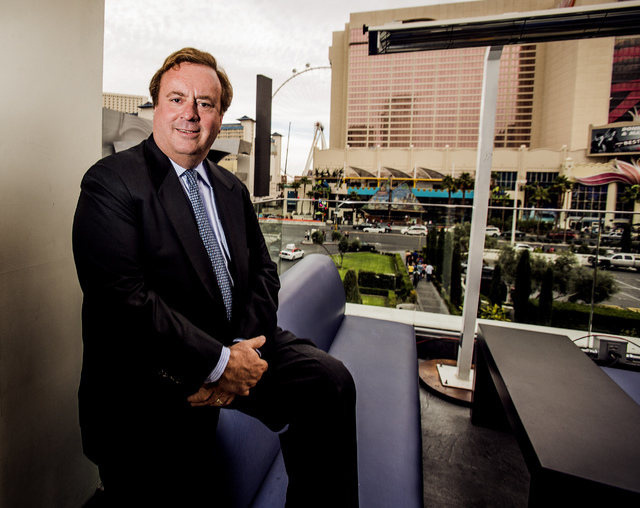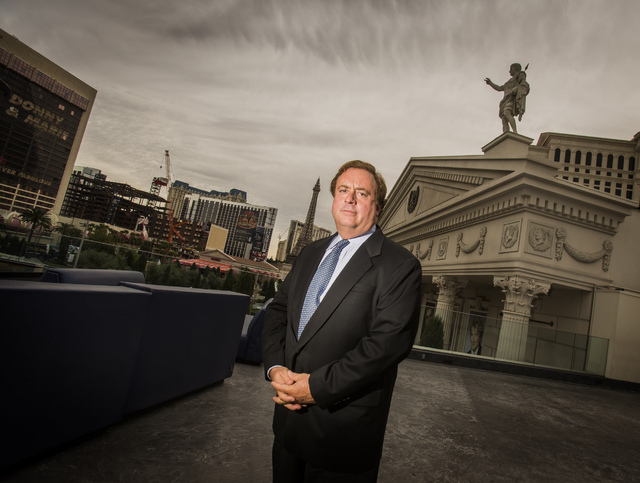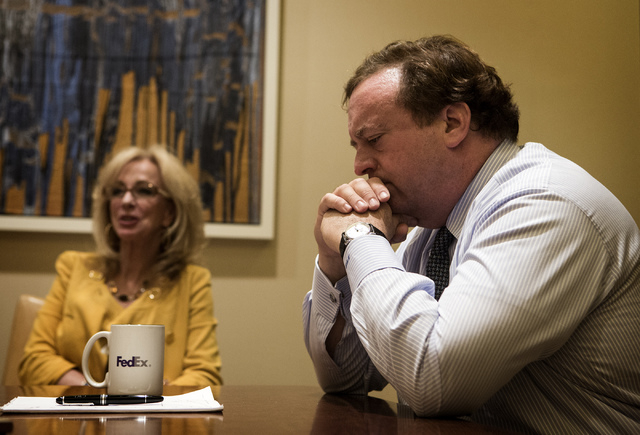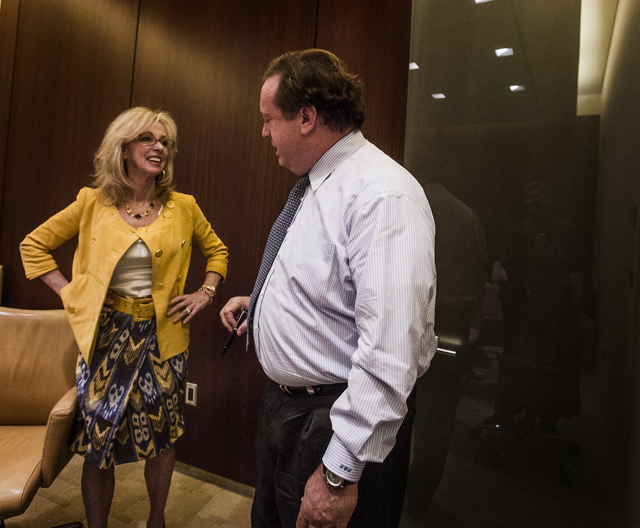Loveman: No bankruptcy seen for Caesars Entertainment Corp.
For Gary Loveman, bankruptcy is not an option.
Loveman, chairman of Caesars Entertainment Corp., admits the casino operator has “a very complicated capital structure” in carrying the gaming industry’s largest long-term debt figure.
However, the company has undertaken several refinancing steps that increased its cash on hand to $2 billion, extended debt maturity dates and opened a corporate growth vehicle that allows Caesars to participate in gaming expansion over the next few years.
During an interview at his Caesars Palace corporate office this past week, Loveman said a bankruptcy reorganization is not in the cards for the company, which operates more than 50 casinos in 13 states including 10 properties on or near the Strip.
“The conditions the company faces today are better and not worse than they have been before,” Loveman said. “We don’t have any significant debt maturities until 2018. We’re much better structured. There is nothing that would trigger a liquidity crisis. We don’t have anything like that.”
Loveman, 53, bristles at analyst reports that the company, which operates some of the gaming industry’s best-recognized brands — Caesars, Horseshoe, Harrah’s and the World Series of Poker — will have to file bankruptcy to tame its long-term debt of $23.7 billion. The debt has a net value of $21 billion.
Earlier this year, Moody’s Investor Service called that debt “unsustainable.”
In an Oct. 31 research note, Wells Fargo Securities gaming analyst Dennis Farrell Jr. told investors the firm remains “uncomfortable with (Caesars) leverage and interest coverage profile.”
Loveman said there is “no scenario that makes any sense to us” that would put Caesars through a court-administered reorganization.
“These same people have been predicting the bankruptcy of the company since 2009,” Loveman said. “So far, they have been unsuccessful in having that prediction made accurate.”
Caesars’ current debt-to-equity structure was no mistake. The debt, Loveman said, was put in place “by design” when private equity groups TPG Capital and Apollo Global Management in January 2008 took the company private through a $30.7 billion leveraged buyout.
He said the debt served a purpose. By placing a high amount of debt on top of a limited equity pool, it was expected cash flow from the business would increase the company’s value, “disproportionately to the equity.”
Using a pen to sketch bar charts on a notepad bearing the logo of the Washington, D.C.-based Business Roundtable, Loveman drew on his academic background as an associate professor at the Harvard University Graduate School of Business to explain Caesars’ capital structure over a five-year period.
The company’s debt is about $4 billion less than it was in 2008, but the equity value has also declined, primarily because of the recession.
“The company has an enterprise value that is second only to Las Vegas Sands or MGM (Resorts International) depending upon the day,” Loveman said, referring to fluctuating bond and stock markets. “The company is one of the most valuable casino companies in the world, but the split between debt and equity is disproportionately debt versus equity.”
different perspectives
Rolling forward to 2013, Caesars has grown. The company bought Planet Hollywood Resort by acquiring the hotel-casino’s debt at a discount; opened the 668-room Octavius Tower at Caesars Palace; built two casinos in Ohio in partnership with Rock Gaming; and is building a $400 million casino in Baltimore.
On the Strip, the company is completing the $550 million Linq project, which includes renovation of The Quad (formerly the Imperial Palace) and the centerpiece High Roller Observation Wheel. The $185 million transformation of Bill’s Gamblin’ Hall into a boutique luxury hotel is also underway.
Although debt remains an issue to some in the investment community, it doesn’t concern Loveman and company insiders.
Last month, as part of a multipronged internal restructuring plan, the company replaced expiring debt with new debt that has maturity dates starting in 2020. The loans are backed by Linq and the Octavius Tower.
Rather than issuing “an enormous amount of new equity” with proceeds going toward retiring the debt, the company secured better loans and backed them with unencumbered pieces of the company.
“It is absolutely accurate to say this an awful lot of debt,” Loveman said. “It is also accurate to say that this is the result of financial transactions and not a bad investment.
“The balance between debt and equity is to some degree a deliberate strategy. Recognizing we could have done other things; we have chosen to pursue it in these terms, given our outlook for the company.”
So why doesn’t Wall Street see things Loveman’s way?
Farrell, although concerned about leverage, said the “elevated bond yields and extended maturity profile offset our fundamental concerns for the time being.”
Deutsche Bank gaming analyst Kelly Knybel told investors on Oct. 30 that Caesars had a “compelling” story, but there are several risks to the investment, including debt levels and the deferred spending.
a stock inviting caution
In February 2012, Caesars put 1.4 percent of the company on the market through an initial public offering. In October, Caesars released 10 million additional shares, raising $200 million.
The two stock sales reduced TPG and Apollo’s ownership stake in Caesars to 64 percent.
“The new equity was purchased like this,” Loveman said, slapping his hands together for emphasis. “There are equity investors who find the idea of a levered equity an appealing play, but it is a risky play.”
However, Loveman said a large stock offering at today’s prices to pay down the debt “was not in the best interest” of TPG and Apollo.
Many analysts, he said, are cautious with a stock like Caesars.
Still, the company has attracted several high-profile investors, including hedge fund billionaire John Paulson, who controlled 12 million shares as of June 30, and Soros Fund Management, the investment arm of billionaire George Soros, a high-profile supporter of liberal and progressive political causes. The fund owns 6 million shares.
“It is best held by sophisticated owners and not retail investors,” Loveman said, adding that Paulson and Soros have not reduced their holdings since the company went public.
The other step in the company’s new corporate structure was creation of Caesars Acquisition Co. to seize expansion opportunities.
Caesars Entertainment owns 57 percent of the new company and holds an option to buy back the rest in three years. Caesars stockholders who chose to participate in a stock sale were able to purchase one share of the holding company for each share they owned in the parent company.
The move raised more than $1.17 billion and placed ownership of Planet Hollywood Resort, Caesars’ interactive gaming division and the under-construction Baltimore casino into Caesars Acquisition.
Apollo and TPG put $500 million into the creation of Caesars Acquisition to “attract like-minded investors,” Loveman said.
Caesars Acquisition provides a way for the parent company to jump into new markets — Caesars is already being linked to a casino project in upstate New York — and avoid adding to the debt.
Loveman believes the corporate leadership has taken the correct financial steps for Caesars Entertainment.
“We feel very confident in (the company’s) future and we are managing it accordingly,” Loveman said.
Contact reporter Howard Stutz at hstutz@reviewjournal.com or 702-477-3871. Follow @howardstutz on Twitter.
RELATED: Loveman still livid about Massachucetts rejection

























